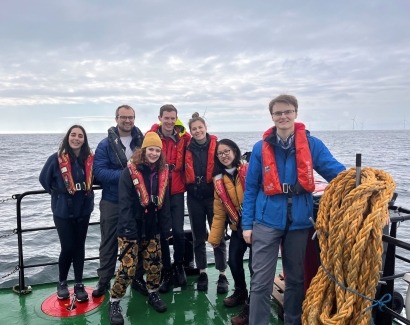
In conjunction with the universities of Exeter, Swansea and Strathclyde, IDCORE works with ORE companies from Orbital Marine to SSE to train the engineers of tomorrow, cementing offshore renewables' place in the UK economy and contributing to net zero strategy.
The program's research engineers help companies improve efficiencies by, for example, studying the impact of turbulence on tidal turbine generators; figuring out how to use oil and gas infrastructure for hydrogen or finding the right vessels to maintain offshore energy installations.
Academic director Professor David Ingram, of Edinburgh's School of Engineering, said: "All students on the engineering doctorate spend three years doing project-based research in a company, driven by the curiosity of the sponsoring company, finding solutions to a problem.
"The level of impact has been remarkable – one student designed a cable routing optimization tool that saved EDF £10 million.
"In another example, engineering models of turbulence often focus on wind farms, but one student proposed alternative models for tidal energy that have influenced the design of next generation tidal installations. If you can be certain about load-bearing, you don't need to over-design and you can reduce the cost of bearings, for example. Providing certainty is worth a huge amount of money to companies."
IDCORE began in Edinburgh in 2011 and is now on its third renewal, having placed 107 students in 57 companies. Around half of those students go on to employment with the same company, 80 per cent within the sector, and 100 % are employed.
Every student has been sponsored by a company, ranging from SMEs to multinationals. On top of the EPSRC funding, companies will provide £3 million in sponsorship and partner universities another £500,000.
Ian Hatch, Head of Business Development for the College of Science and Engineering at Edinburgh Innovations, the university's commercialization service, said: "IDCORE is an outstanding example of academia and industry coming together to give a generation of students the skills, vison and immersed experience of a career in the renewable energy sector. We are delighted that the offshore renewables sector and our future students will see many more years of benefit from this excellent engineering doctorate program."
Dr. Gianna Huhn, Head of Academic Partnerships at SSE, added: "As a leading energy developer in the UK, it is important to for SSE to have strong partnerships with stakeholders across the industry.
"We are delighted to have a strong and flourishing relationship with the University of Edinburgh and are thrilled that the IDCORE program has just been renewed as a leading training program for offshore engineering doctoral students. A close collaboration between industry and academia lies at the heart of the energy transition and decarbonizing the UK's energy system at scale and pace."
PHOTO: IDCORE students visiting the SeaGreen offshore wind farm - Scotland's largest, west of Arbroath

